
Professional Bee Removal Services
We provide safe and humane bee relocation services throughout Southern California. We are fully insured and licensed.
Give us a call at (619) 777-BEES(2337)
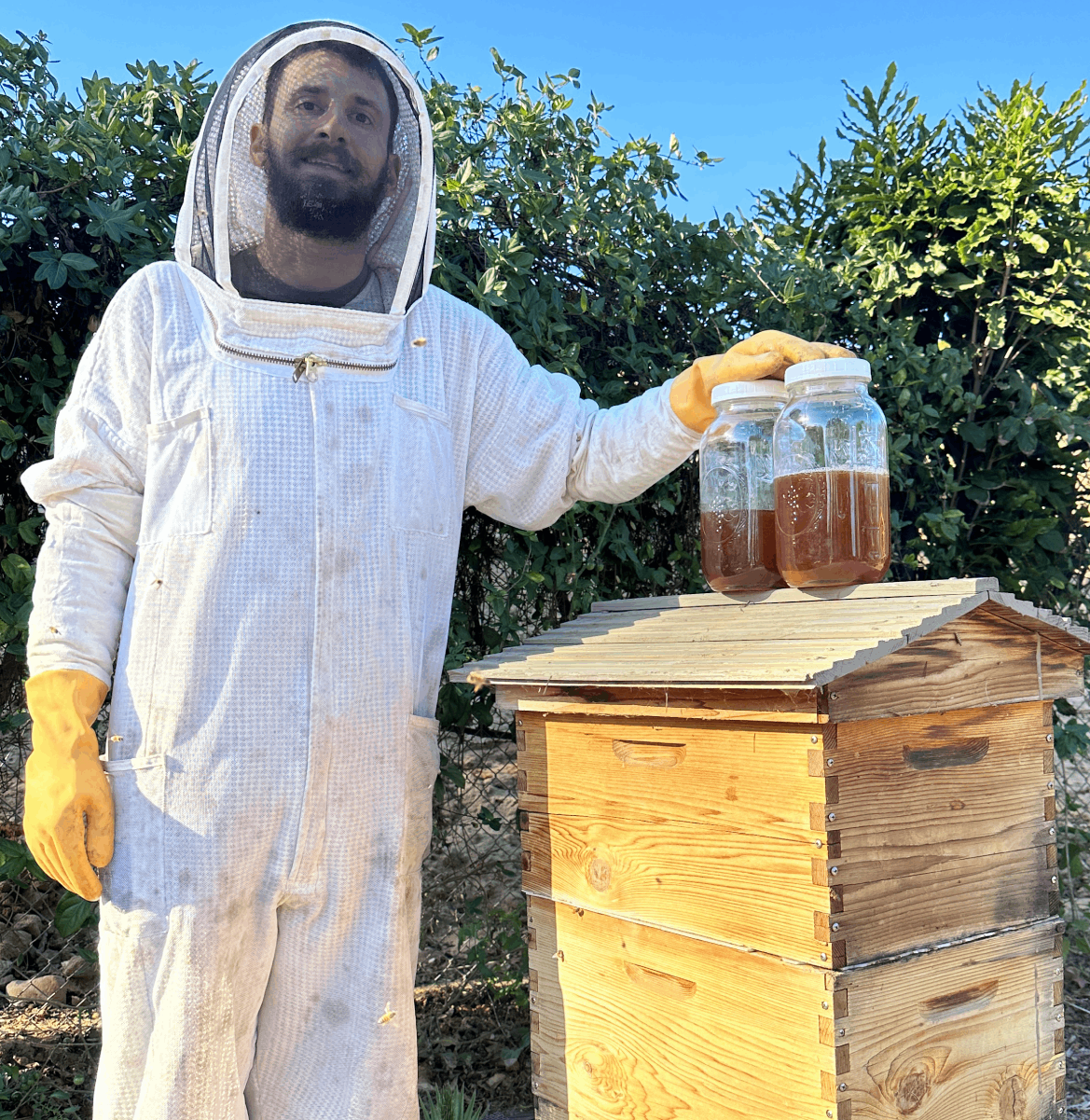
Our mission is to bridge the gap between bees and humans by providing safe bee relocation services. Through our commitment to sustainable practices, we exclusively employ organic methods, avoiding harmful chemicals and pesticides to protect bee health. Each removal project, regardless of size, temperament, or location, receives exceptional care and attention both during the relocation process and at our dedicated apiaries. We strive to foster bee population growth while promoting harmonious coexistence between humans, bees, and the broader ecosystem.

Our mission is to bridge the gap between bees and humans by providing safe bee relocation services. Through our commitment to sustainable practices, we exclusively employ organic methods, avoiding harmful chemicals and pesticides to protect bee health. Each removal project, regardless of size, temperament, or location, receives exceptional care and attention both during the relocation process and at our dedicated apiaries. We strive to foster bee population growth while promoting harmonious coexistence between humans, bees, and the broader ecosystem.
Our expert team specializes in professional bee relocation services, ensuring a safe and efficient removal process regardless of hive location or colony size. We employ advanced techniques and maintain the highest safety standards throughout the procedure.
Complementary prevention services are included with every removal when applicable. Our goal is to successfully rescue the bees and do our best to keep them from returning.
Want bees but don't have the time or confidence? Our residential and commercial apiary maintenance is a comprehensive service to keep bees on your property.
We combine modern day technology with decades old techniques to precisely locate where your bees are.
Our eco-friendly method is gentle enough to remove the bees without causing harm to the colony. We try to be as organic as possible when working with bees.
We implement preventive measures to protect your property from future bee infestations, when applicable.
Once the bees are relocated to a bee box we transport them to one of our apiary spaces across San Diego County.
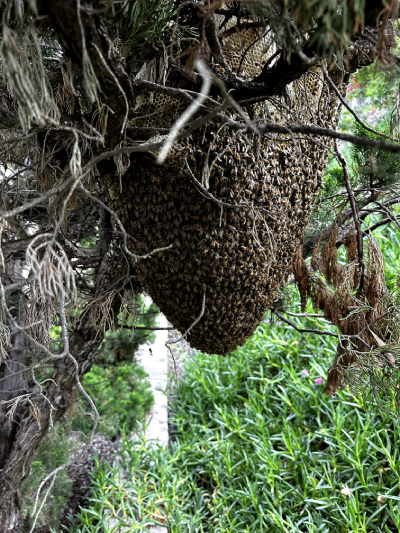
Expert removal of bee colonies from trees and branches
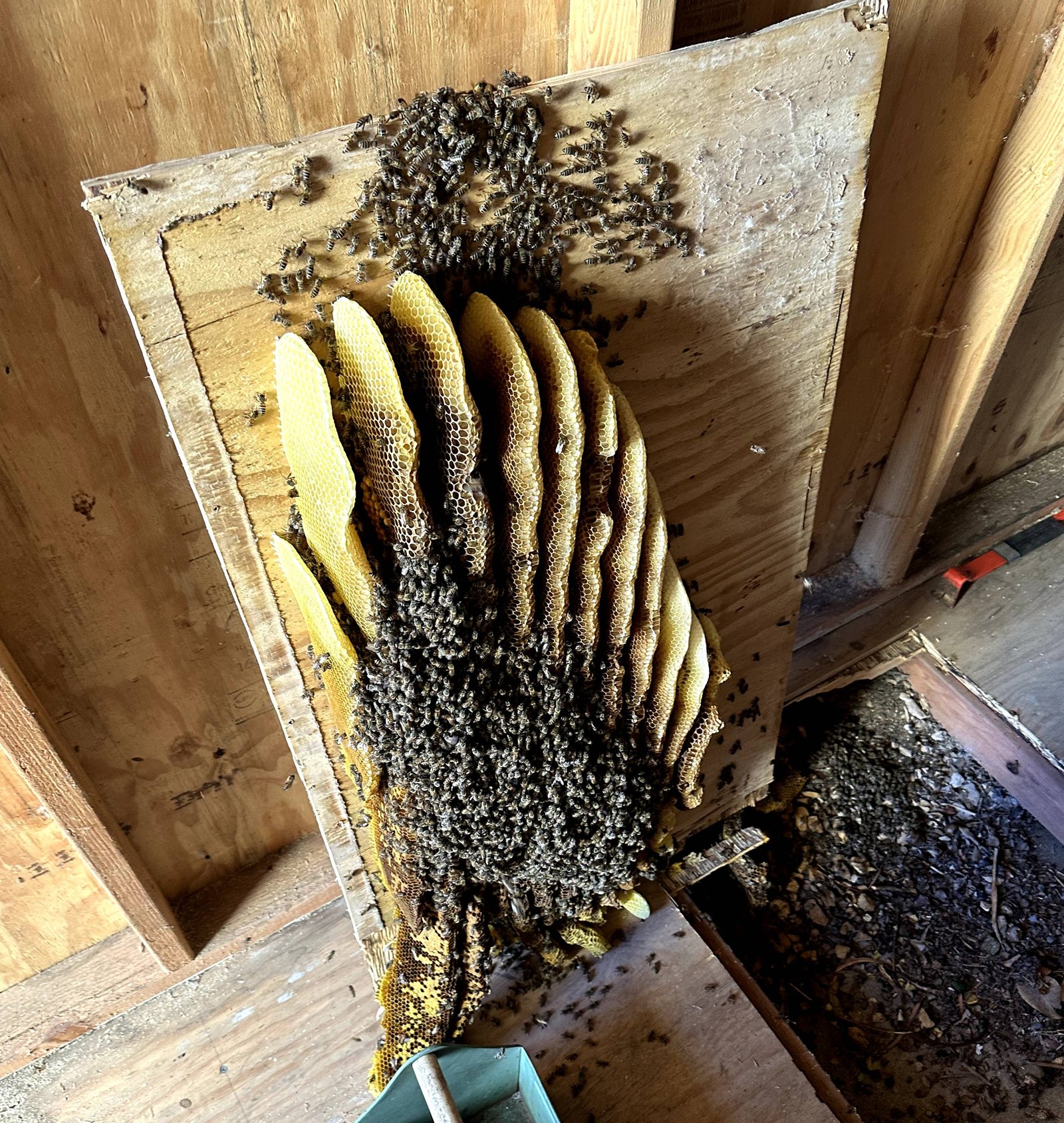
We safely remove the bees, repair the shed, and prevent future colonies from moving in
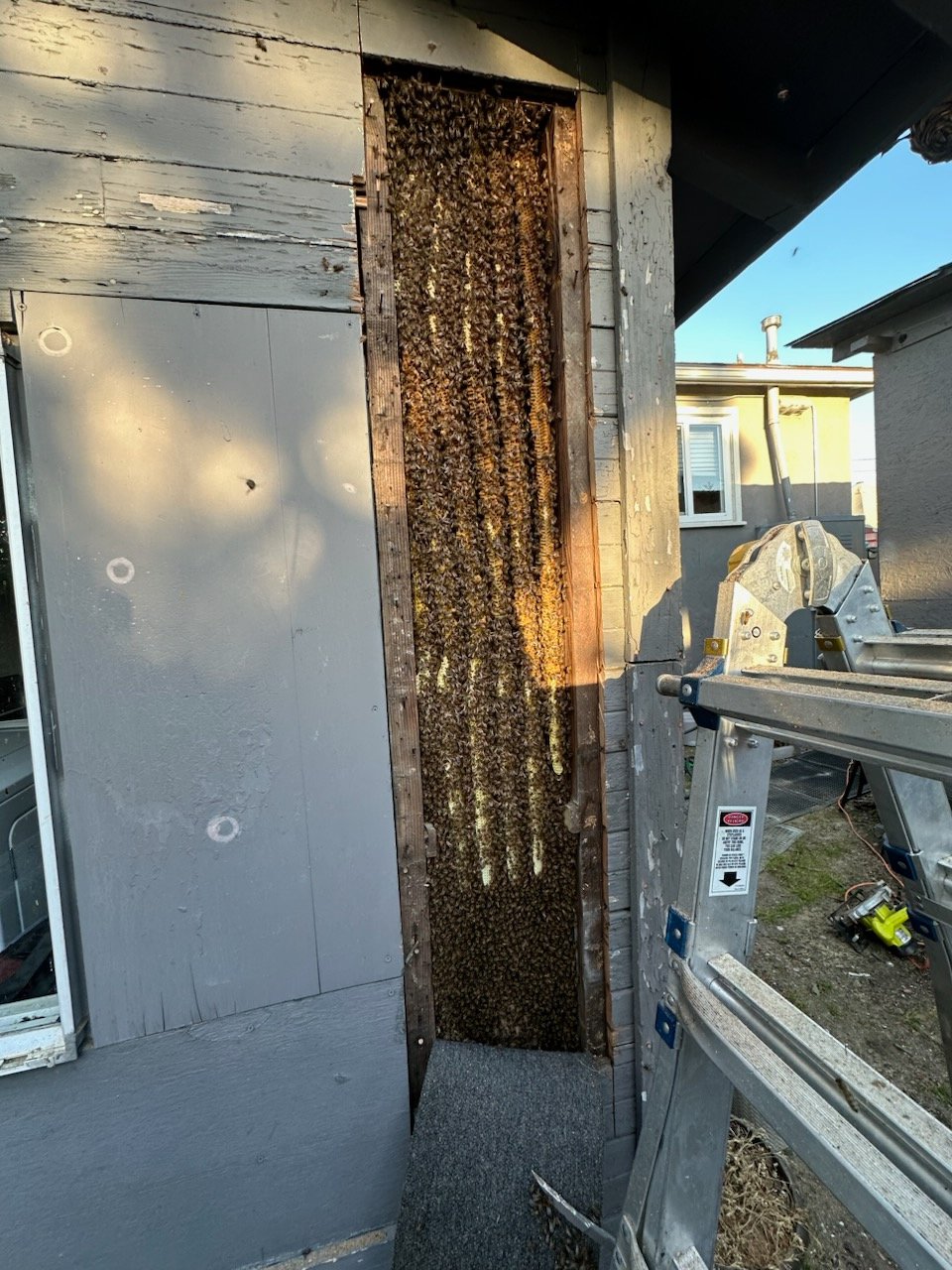
We cut into wood, stucco, brick, etc. walls to safely rescue bee colonies

Bees often move into water valve boxes because they offer an insulated home from predators
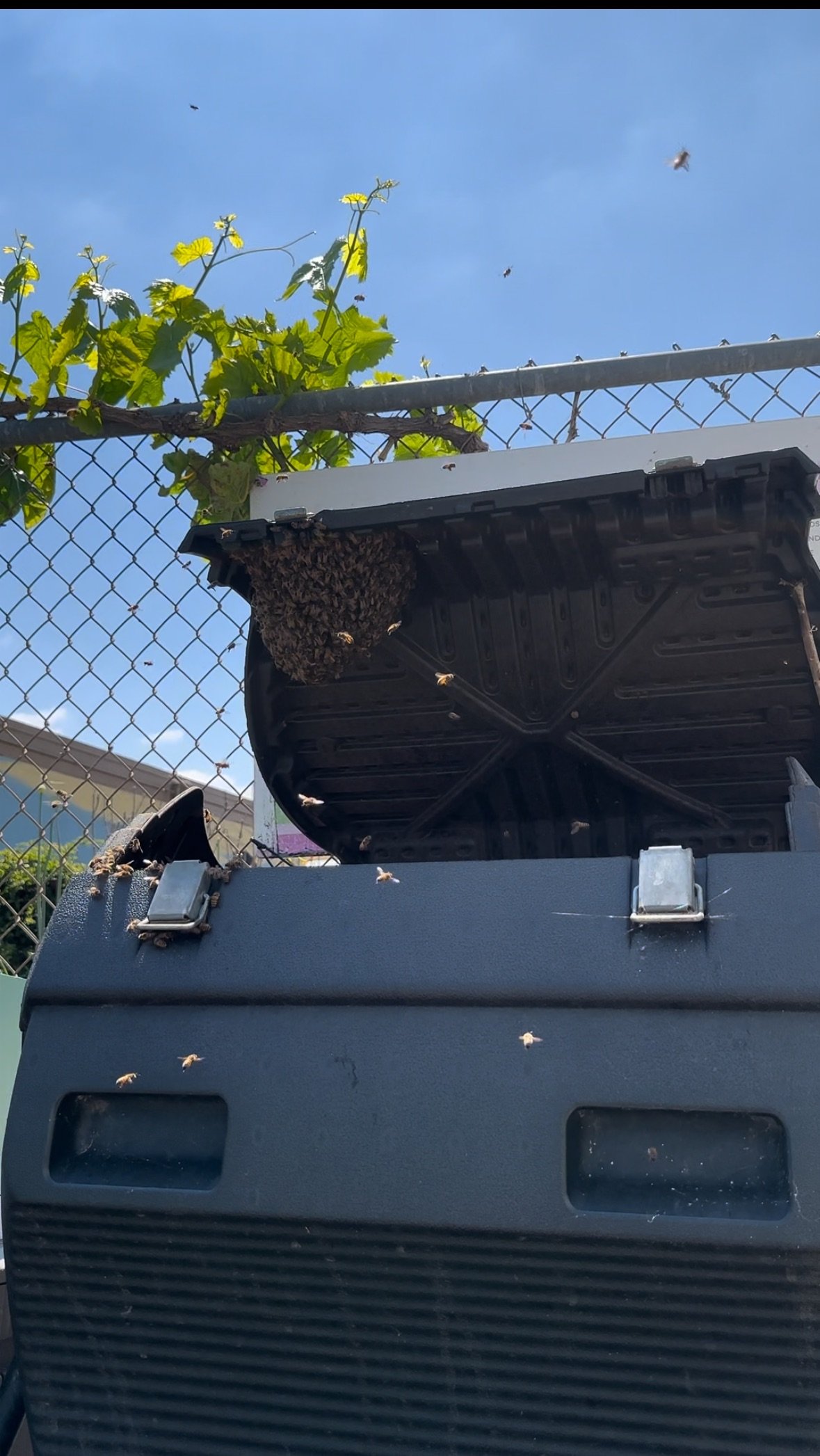
Compost bins are rich with nutrients and offer a dry space bees love to move into
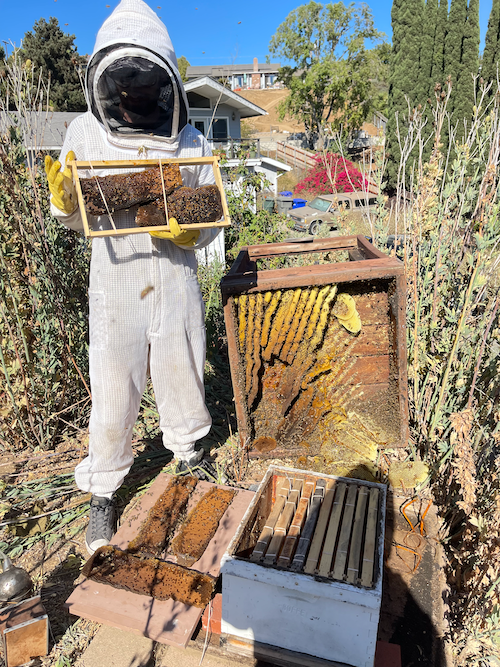
We try to use the most organic and humane methods when relocating colonies
First, always maintain a safe distance from bees! You should call a beekeeper if you see a cluster of bees (typically the size of a basketball, but it can be bigger or smaller). If you notice a continuous stream of bees coming from a structure, this is a sign that you have a colony living in a specific area. You don't need to call if you see bees buzzing around your garden on flowers and other plants. These are typically forager bees just doing their job to get food for their colony. Bees in your pool or other water source could be an indication of a nearby colony, but usually, they're just thirsty forager bees seeking water.
When bees move into your home it could be a stressful situation, and on top of that Googling "Bee removals near me" brings up a slew of companies, here's some advice on picking a legit beekeeper vs pest control company. Ask where they take the bees afterwards and see if that company can provide pictures/videos! Social media is a great way to verify (I love posting my crazy removals but nothing more rewarding than showing off my healthy bee colonies enjoying their apiary).
Determine if they use any harsh chemicals or pesticides, beekeepers refrain from using them as they contaminate equipment, and make it unsafe for bees. Ensure they are using proper bee boxes or will transfer them to a hive box. Using plain cardboard boxes, garbage bags, buckets, etc could be a sign the bees are not going to get proper care. We have all been in a pinch before (like getting a swarm call on your way home from the grocery store), and beekeepers are known to get creative, but make sure the bees will be transferred to a respectable home when they are relocated!
While we love saving the bees, we also incur expenses in the process — such as gas, bee boxes, protective gear, mite treatments, and food supplements — not to mention the time it takes to safely relocate a colony. We aim to keep our prices reasonable and competitive with both other bee removal services and pest control companies. You shouldn’t have to face a moral dilemma when it comes to protecting bees. Our removal specialists will always present the most cost-effective and efficient solution to save these pollinators.
Additionally, when structural cuts are necessary, we take the least invasive approach possible — and in many cases, we can repair the area as if nothing ever happened.
When we perform a honey bee removal there is sometimes honey, and sometimes a lot of it! We cannot take it with the bees as this often encourages neighboring bee colonies to rob the newly relocated bee hive. Depending on where the removal is, we are often more than happy to give the honey to our customers. All we ask is that you provide a large plastic container with a lid, or a pot with a lid. Keep in mind not every removal has honey and/or it might not be sanitary for us to give. Your bee removal expert will be able to provide further information upon arrival and assessment of the bee colony.
Yes, no bee colony is too aggressive for us to help relocate. We have protective gear that keeps us safe during the process. Once at one of our beeyards, we can correct any "spicy" behavior through a process called requeening, where we replace the feral queen with one that has been bred with more docile genetics. The rest of the colony remains unharmed and continues its natural life cycle.
We have several apiary spaces throughout San Diego County. In these rural spaces, the bees can live their natural lives free from disruptions, away from humans and animals. Here, we rehabilitate any weak colonies, requeen aggressive hives, provide supplemental feeding, treat for Varroa mites, and generally help these colonies reach their fullest potential.
Unless you have prior beekeeping experience, completed beekeeping courses (we recommend the Penn State Extension Course), or working with a mentor, we do not recommend keeping the bees yourself. If you neglect your bees, they can become aggressive, become a hotspot for mites and viruses that damage wild bee populations, and pose potential hazards to pets, neighbors, and anyone nearby.
You can help bee populations by planting a native pollinator-friendly garden (UC Davis Guide), avoiding pesticides around your house, garden, or business, and always calling a reputable beekeeper when dealing with any bee colony issues.
Please notify all nearby neighbors to be cautious during the scheduled date and time. We recommend limiting outdoor activities, keeping all pets indoors, and ensuring all windows and doors are shut. A typical removal lasts 2-3 hours, but we suggest remaining cautious until we have collected the colony.
Still have questions? We're here to help!